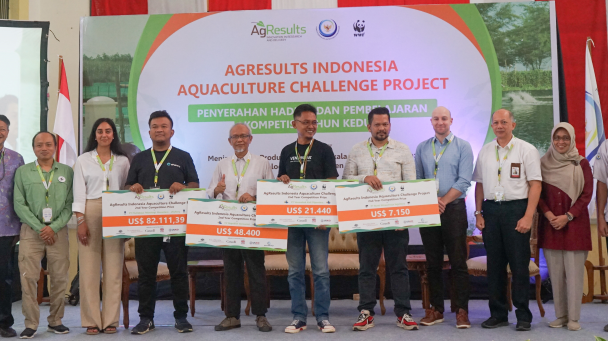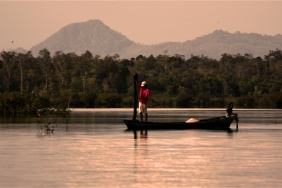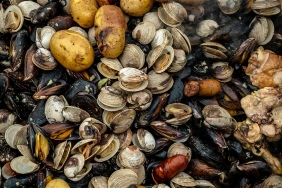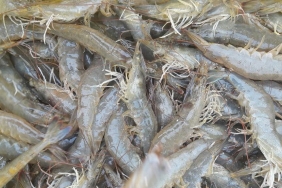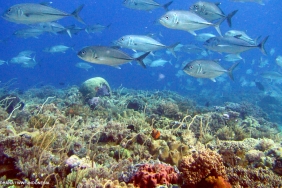PARTNERING WITH PRIVATE SECTOR, 1,917 SMALL-SCALE FISHERIES FARMERS USE ENVIRONMENTAL FRIENDLY TECHNOLOGY
Jepara, June 6, 2023 - Four companies engaged in aquaculture innovation and technology received prizes for successful sales and rental of equipment, PT Multidaya Teknologi Nusantara (eFishery), PT Venambak Kail Dipantara, CV Republik Vannamei, and PT Bumi Wirasatraya Sejahtera. Prizes in the form of incentives totaling 159,101.39 US Dollars or approximately 2.3 billion rupiah were awarded at the closing and learning event of the second year competition of AgResults Indonesia Aquaculture Challenge Project.
More than 90% of aquaculture ponds in Indonesia are traditional ponds with an area of 522,600 ha. Not all of these traditional ponds are actively operating, 56% of them are idle or converted ponds. Traditional ponds are synonymous with low productivity, utilization of existing resources such as land and water, not proportional to the expected yield. To increase productivity, intensification is needed through improved management and cultivation systems. On the other hand, traditional farmers have many limitations including access to technology. So far, there has been a high dependency on existing government programs to increase access and capacity. The inefficiency of small-scale aquaculture practices not only affects the productivity of aquaculture products, but also has an impact on the environment (waste of resources, pollution, damage to ecosystems, etc.) which will also have an impact on the sustainability of the business itself. This is also characterized by hundreds to thousands of hectares of abandoned ponds, one of the main causes of which is the decline in environmental carrying capacity.
The competition awards prizes to the private sector for each aerator and/or auto-feeder technology sold or leased by small-scale farmers as one of the key technologies for aquaculture. The aim is to increase productivity, improve farmers' income, and strengthen value chain linkages between aquaculture technology providers and small-scale farmers.
"After the first year of the competition, which was faced with the COVID-19 pandemic, we saw a significant improvement in the achievements of the participants and the adoption of technology by small-scale farmers in this second year of the competition. The purpose of today's event is to share the lessons learned, as well as to symbolically award prizes to four participants who successfully met the technology sales and leasing requirements in the second year," said Kimya Nia, representative of the AgResults Secretariat.
There were 547 units of equipment sold and 3,650 units of equipment leased to small-scale farmers in Java and outside Java, with the highest target cultivation commodities being tilapia, catfish, followed by vannamei shrimp and catfish. Indra, a farmer from Tegal, said that by using the autofeeder technology, productivity has increased as seen from the more efficient use of feed, from the previous FCR (Feed Conversion Ratio) of over 1.4 which can be reduced to 1.2. "The use of this tool can also shorten the cultivation cycle," said Indra.
Dr. Imam Musthofa Zainudin as the Director of Marine and Fisheries Program of WWF Indonesia Foundation said "Increasing aquaculture productivity independently by farmers requires the support of various supporting sectors involved in the aquaculture value chain, such as the availability of quality seeds, supporting cultivation technology, assistance and the availability of standard operating procedures and good cultivation guidelines to support the sustainability of aquaculture businesses and a healthy environment/ecosystem."
Through this activity 1,917 small-scale farmers have adopted technology for the production of aquaculture commodities so that the use of resources is expected to be more efficient. The input of aerators can streamline the use of water and land, while the use of auto-feeders can streamline the use of feed. This efficiency can also maintain the sustainability of the aquaculture business. In addition to increasing the productivity and income of small-scale farmers, these efficiencies can maintain the sustainability of aquaculture businesses.
This project is supported by AgResults secretariat Deloitte with funding from the Australian Government, Bill and Melinda Gates Foundation, Canadian Government, UKAID, USAID, and World Bank Group.
[END]
For more information:
• Salsabila Ghina Utami, Agresult Administration WWF Indonesia 0813-3721-8883 | agresults-admin@wwf.or.id
• Karina Lestiarsi, Communication, Campaign & PR Team WWF-Indonesia 0852-181-616-83 | klestiarsi@wwf.id
About AgResults
AgResults is a $152 million collaborative initiative between the governments of Australia, Canada, the United Kingdom, the United States, the Bill and Melinda Gates Foundation, and the World Bank Group that utilizes prize competitions to encourage the private sector to overcome market barriers and deliver long-term change. Through the pay-for-results model initiated by AgResults, the competitions encourage businesses to achieve predetermined outcome points and quality to receive intensive monetary rewards.
About WWF-Indonesia
WWF-Indonesia is an Indonesian civil society organization engaged in nature conservation and sustainable development, with the support of more than 100,000 supporters. WWF-Indonesia's mission is to halt environmental degradation and build a future where people live in harmony with nature, through the conservation of the world's biodiversity, the sustainable use of renewable natural resources, and support for the reduction of pollution and overconsumption.

